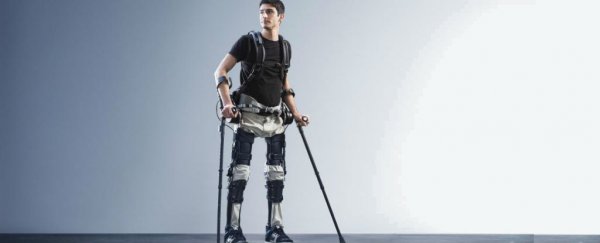Before robots become clever enough to take over the world, they're first going to help us overcome the frailties and imperfections of the human body. It's been five years in the making, but researchers in the US are now showing off an exoskeleton device that's almost ready to hit the market to help people who have been permanently paralysed walk again.
Developed by a team from the University of California, Berkeley, the suit - called Phoenix - is lightweight, modular, and relatively affordable (at least compared to other similar contraptions). For many, Phoenix could act as a replacement for a wheelchair, allowing them to take small but stable steps or even join in a game of soccer.
"This machine helps with a couple of different things: rehab, exercise and involvement in everyday lives," paraplegic Steve Sanchez told Fast Company. "I'm not the robot, I wear the robot. Of course, there's other exoskeletons out there, but the big problem with those is their price points."
More expensive suits can cost several hundreds of thousands of dollars, putting them beyond the budget of most. The Phoenix, on the other hand, has been made as light and as cheap as possible through some careful engineering - the researchers use algorithms to infer more details from fewer physical sensors, for example. The Phoenix is still waiting on regulatory clearance, but could be available for around $40,000 in the US.
While that's still expensive - by comparison a top-of-the-line wheelchair will set you back around $10,000 - it's significantly cheaper than the alternative options, and costs should come down as more suits are manufactured. Meanwhile, the modular nature of the suit means different parts can be added or removed depending on the needs of the wearer: the Phoenix takes its cues from the design of the human body rather than the principles of industrial robotics.
Michael McKinley, one of the robotics engineers working on the project, says the efforts of volunteers Steve Sanchez and Daniel Fukuchi have been invaluable in developing the final design of the suit: "We've worked together, almost as a two-part team. We're bringing the science and they're bringing the insight from their reality."
The team has launched a spin-off company called SuitX to sell the Phoenix commercially, and there are plans to develop a children's version too.
With other exoskeleton suits such as ReWalk also bringing new innovations to the field, the future looks promising for those working to use robotics to overcome human disabilities. The suits of today are already impressive, and they're only going to become more advanced, more natural, and more affordable from here on in.
